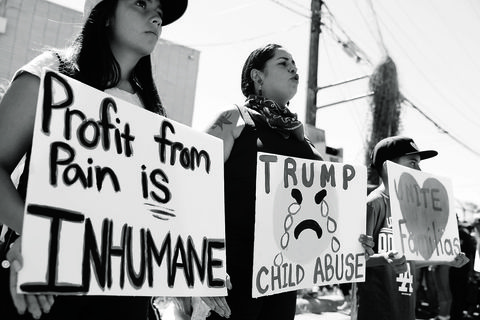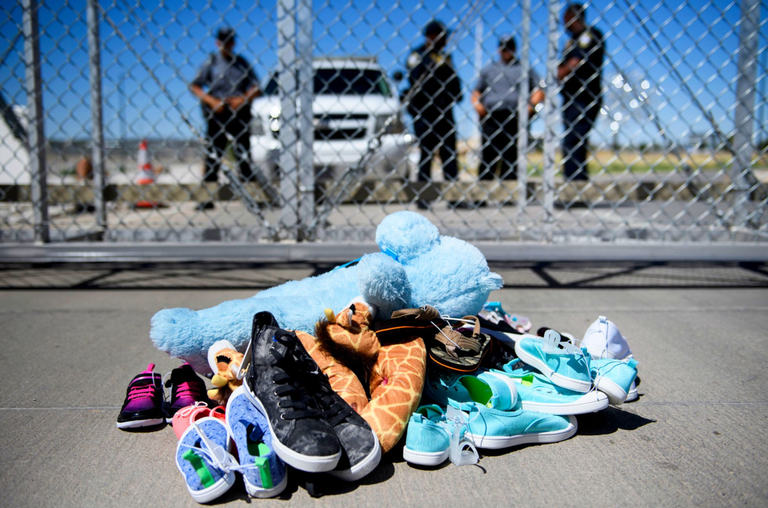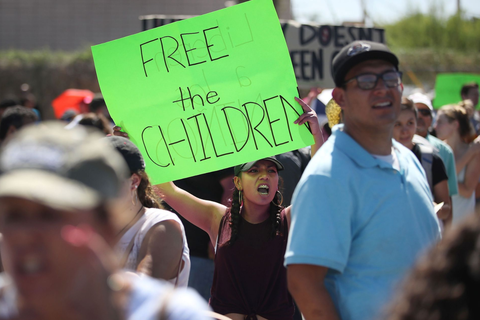“I Was Taken to a Huge Cage”
One Salvadoran teenager recounts being separated from her mother at the U.S.–Mexico border in June.


Over the summer, as the U.S. separated nearly 3,000 children from their parents under President Donald Trump’s “zero tolerance” immigration policy, activists gained access to detention centers to make sure the kids were being cared for properly. One such watchdog was Michelle Brané, director of the Migrant Rights and Justice program at the New York City–based Women’s Refugee Commission, who spent time in immigration processing centers in McAllen, Texas. She was there to monitor conditions and treatment of children under the Flores Settlement Agreement, a 1997 court decision that requires the government to maintain a certain quality of life for detained minors and release them without unnecessary delay. While there, Brané encountered a 16-year-old girl from El Salvador caring for a little girl from Honduras whom she had met inside the cage. The teen, who asked that we not use her name to protect herself and her family, all of whom are undocumented, told her story exclusively to Marie Claire.
I first came to the U.S. from El Salvador with my mom when she was 19 and I was 3. We left because of the gangs. A neighbor called my grandfather, who lives in Detroit, and told him gang members were looking for us. Gangs don’t beat around the bush. When they say they are going to kill you, they do it. We left the next day.
Six weeks later, we reached the Rio Grande river. I remember the coyotes put us on a pool float and said, “Don’t look up and don’t move, because if you do, you’re going to fall,” and I nodded. When we got to the other side two minutes later, the guy was like, “My job here is done.” My mom said, “Well, what do we do now?” and he replied, “You walk.”
We walked for about 90 minutes before I told my mom I was hungry, and she took me to a gas station to get some food. Immigration officers came in, and that’s how we got caught. They questioned my mom, who told them we wanted asylum, and since I was a minor and my mom was not 21 yet, they let us go, telling us we would get a court date in the mail. From there, we took a bus to Dallas, where my grandpa was waiting to drive us to his home in Detroit. I remember my mom pointing across the parking lot, saying, “That’s your grandpa,” and we started running to him.

Opponents of family separation rally outside an immigration processing center in El Paso.
After settling in Detroit, we formally applied for asylum. We would have court dates every so often, but nothing happened. Our lawyer always told us, “Everything’s fine. I have everything under control.” She was so convincing, so we didn’t worry.
We lived with my grandpa until my mom met my stepdad; soon, my sister was born. Everything was good. I loved school. I was an honors student and took AP classes. My only worries were what my dress color and heels were going to be for junior prom. I was looking forward to graduating because I was going to make my mom proud. She’s always saying, “I want to see you become somebody important, somebody great.” I want to go to college to study medicine so I can become a pediatrician.
In 2017, we had an appointment with ICE, and they told us we might be deported. Our attorney told us they were just trying to scare us, but at our next appointment two weeks later, they said, “Get your stuff ready. You’re leaving tomorrow at 4 a.m.”
Get exclusive access to fashion and beauty trends, hot-off-the-press celebrity news, and more.
We had 12 hours. I had to take myself out of the school system, pack everything, and say goodbye. I called my friends, and they said, “You’re lying—you’re not leaving.” So many people came to say goodbye, and there was a lot of crying. It was a really bad day.
El Salvador was a drastic change. By 7 p.m., everyone is inside their houses because they’re scared of the gangs. All the stores close. It was so weird to me. I would tell people that in the U.S., stores are open 24 hours, and they wouldn’t believe me.
My mom and I went to enroll me in school. I would have had to cross gang territory to get there. The assistant principal told my mom, “If you’re going to be putting her in school, you better be preparing for her funeral.” It was really scary.
I thought this was going to be the last time I saw my mom.
Because of the gangs, you can’t do anything in El Salvador. My mom wanted to open a little store in our house to sell snacks and juices. I thought it was a great idea, but our aunt, who we lived with, said if the gangs saw us prospering, they would ask for money, and if we didn’t give it to them, we would be killed.
At the beginning of this year, my mom raised the idea of going back to the U.S. so I could go to school. She was like, “Are you willing to do it?” and I was like, “Yes! Yes, I am!” I didn’t even hesitate for one second.
We traveled by car to Mexico. The coyotes put me in the front seat because I have a pale complexion. They said, “If the police try to stop you, just bust into full English and say you’re not from here.”
We crossed the Rio Grande in an inflatable boat and stayed in a large garage behind a house somewhere in Texas with more than 25 other people. The coyotes had paid the owners to hide and feed us. After a week, they told us we were being moved to Houston. They put us in a trailer that had holes in the ceiling.
There were 22 people inside: 5 women and 17 men. When we crossed an immigration checkpoint, I could hear the officer ask about the holes. He said, “I’m more than sure you have immigrants in there. Open the door.” He was getting a little aggressive with the driver. I heard a key jingle, and they opened the door. They told us to take the laces out of our shoes so we couldn’t run. We were taken to a processing center in McAllen. I sat with my mom in a cell until they called my name. They took fingerprints and photos and gave me a form that said I had two options: I could see a counselor and present myself in front of a judge, or I could decline and return to my country. The officer suggested I check the bottom one, but I was like, “Wait, wait, wait.” I know my rights because I took a civics class in school.

Shoes and toys left behind at a detention center in Tornillo, Texas.
The officer’s Spanish wasn’t very good, so I said, “Why don’t you speak to me in English to make it easier?” He was shocked. The officers had been cracking jokes, fooling around, and I had understood everything. They talked about how stupid we were to cross the border and how dumb we were to think we wouldn’t be deported. The officer was so embarrassed, and I was just laughing. After that, they started treating me differently. They’re like, “Are you okay? Do you need this? Are you hungry?”
They said they were opening a case for me so I could fight to stay here. One let me say goodbye to my mom. Honestly, I thought this was going to be the last time I saw her because the officer told me she was going to be deported. I started crying. My mom told me to trust in God that everything was going to be fine and to never lose faith. I told her, “I love you, I love you so much,” and she said, “I love you too.” The officer said he was sorry. I was like, “It’s okay. I understand there are laws and rules you have to follow.”
I was taken to a huge, huge cage inside a detention center. They had other cages for the boys, men, and women. It was prison. We could see the other cages, but we weren’t allowed to talk to anyone outside our cage. There were more than 100 girls in there, all from El Salvador, Guatemala, and Honduras. Most of the girls were between the ages of 6 and 17, but there were a few very young girls too. The little kids would cry, especially when they first arrived. They were saying how much they missed their parents and how much they wanted to go home. The officers wouldn’t really pay much attention to them; they just walked away like nothing happened. The big girls would try to calm them down. We would play with them or tell them to watch the movie playing on the TV.
This little girl kind of attached to me. I took care of her. If I didn't, no one else would have.
The older girls and I would talk about our lives. We traded stories about our trips from our countries to the U.S., about where and how we got caught. They asked me about the U.S.: How is it here? Is everything different? Is it as it seems from the TV? We didn’t know that anyone on the outside was fighting for us. I was surprised when I got out and heard that a lot of people had been protesting. I had no idea how big it had gotten. I am proud of the people for standing up and very thankful for those who have called for change.
The lights were on at all times, which really messed with my sleeping schedule. They would give us a sandwich or burrito to eat, along with Lay’s chips, an apple, and bottled water. Sometimes they would be nice and give us juice. It was freezing. We aren’t used to air conditioning, so most of us got sick with colds. The officers said they couldn’t give us any medicine without our parents’ permission. But how could we get permission if we couldn’t speak to our parents?
Many of the girls told me the officers had given them their rights in English, not Spanish. They asked them to translate, but they said they couldn’t. I asked the girls if the officers explained anything to them, and they said, “Not really. They were just flipping the pages and saying, ‘Sign here, sign here.’ ” And I was like, “OK, so these are your rights,” and I explained everything. I told them not to sign papers if they didn’t know what they said. One time, one of the girls told me, “They showed me a paper in English and I said I wouldn’t sign it.” She said it so proudly. They told her they would come get her when they had a form in Spanish.

Opponents of family separation rally outside an immigration processing center in El Paso.
I met five girls who were taking care of a little girl from Honduras who looked to be about two years old. We knew her name because she had a bracelet on her wrist, but nothing else. Officers started taking the other older girls to a detention center in Miami; soon, I was the only one left and this little girl kind of attached to me. She wouldn’t listen to anyone else but me. I know how to change diapers and make a bottle, so I took care of her. If I hadn’t, no one else would have. She wouldn’t really talk; she was saying the same word over and over, but I didn’t understand. After a few days, her aunt came to get her and I learned the word she’d been repeating is her aunt’s nickname.
The officers told me many different things. One day, they said my mom had been deported and was on her way to El Salvador. Another time, they told me and four other girls we were going to Miami and we were going to start going to school. Then they said I would be sent back to El Salvador without my mom. I was devastated. I didn’t grow up there. In Detroit, I can take you wherever you want. If you want to eat, I can take you to eat, but I don’t know El Salvador like that. I said, “What am I going to do? I don’t have money. I don’t even have a phone number.”
On my fourth day in the cage, they told me I was staying in the U.S. A few hours later, I heard an officer calling my mom’s name. I sat up real quick, like, Am I hearing things? Ten minutes later, I saw my mom signing some papers and watched as they put a tracking device on her. Then they brought me to her and we hugged. I said, “Mom, how are you?” And she said, “I’m okay, honey. How are you?”
They gave us our belongings and brought us to a bus station. They told us to contact our family so they could buy us tickets. We arrived back in Detroit a few days later. My mom is supposed to be deported, but no date has been set and our lawyer is fighting the order. I am fighting, separately, to stay. My mom and I have talked about what it will be like if I get to stay and she’s forced to leave. She says, “Honey, you’ll be able to study. At least your future is going to be set. If you have the opportunity, then why waste it?” I tell her I’m going to miss her, but she tells me sometimes we have to make sacrifices. I don’t like talking about it because it makes me really sad just to think about my mom not being here.
Being back in Detroit after 10 months away is amazing. I missed it so much. Most of my friends didn’t know I was coming back, so it was a huge surprise. I re-enrolled in school; they have been so supportive and have said they will do everything in their power to help me graduate on time. I am supposed to start my senior year this fall.
This article originally appeared in the September 2018 issue of Marie Claire.
Kayla Webley Adler is the Deputy Editor of ELLE magazine. She edits cover stories, profiles, and narrative features on politics, culture, crime, and social trends. Previously, she worked as the Features Director at Marie Claire magazine and as a Staff Writer at TIME magazine.
